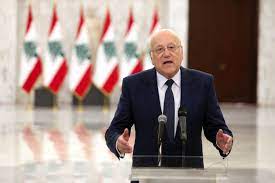With support from Iran-backed Hezbollah, Najib Mikati was appointed Prime Minister for Lebanon, a position that can only be held by a Sunni Muslim, which is part of the nation’s sectarian system that has been in place for generations. Only a Sunni Muslim can be Prime Minister, the Speaker can only be a Shi’ite Muslim, and the President must be a Maronite Christian.
While it’s an interesting dynamic politically, there have been some challenges to overcome through the years because of it. One of those may very well prove to simply be too much, even for a Lebanese billionaire who has headed three governments already since 2005.
Securing this position was not in much doubt, given that other nominees could not gain any real traction in their efforts to win the seat. However, due to a fractured government politically and religiously, there is a growing chorus of detractors who do not believe Mikati will manage to get a new government in position and working on the deep economic challenges quick enough.
What is most pressing, the one thing that Lebanon is facing that could completely collapse it and the government, is economic failure. The country has been teetering on ruin for years and while the International Monetary Fund (IMF) has pledged to assist, that is contingent on a working government body and some legislation to handle the crisis.
Ninety percent of Lebanon’s currency value has been obliterated during the third year of a financial meltdown. The IMF has pledged $3 billion in assistance, but there are contingencies, most notably that reforms are put in place. Unfortunately, Lebanon’s political class has continually kicked the proverbial can down the road on that matter. Currently, people who have their money in banks can’t access the funds. Savings have been frozen. The crisis threatens to destabilize the country.
Time is running out, though, and now Mikati must form a government in a matter of weeks, if not sooner. Countries that are willing to help have told Lebanon’s leaders for years that corruption and waste are some of the contributing factors and they need to be dealt with now.
Mikati is currently saying the right things, but words mean little when there’s no action and there can be no action without a working government and few are giving him the confidence to manage this feat in time.
“We have wasted enough time and lost many chances of support from brotherly and friendly countries whose stance has always been clear: ‘help yourselves so we can help you,’ said Mikati.
At the moment, the Prime Minister who hails from Tripoli will remain in charge of the cabinet, which is in a caretaker position until the new government is fully formed. He wants the new parliament, whoever it ultimately becomes, to pass legislation that had been referred to by the previous government, but which failed to get things done. Doing so will open the path forward for the IMF to finally infuse the nation with that much needed financial aide.
Unfortunately, there are too many deep divides among the elite, most of whom either have roles in the government, want new roles, or have strong influences, and those divisions are part of the ongoing challenge to get reforms done. Now, though, it’s unclear how quickly Mikati can install a new parliament to get moving in the right direction.
As it stands now, without financial help, there is an increasing risk that Lebanon will collapse. What that could mean varies, depending on who one speaks to, but with influences from outside actors, like Iran’s not-so-secret support of Hezbollah, it could lead to civil conflict and quite possibly a fractured nation.
Although Hezbollah gave Mikati the support he needed to gain enough votes and remain as Prime Minister, there are questions surrounding the new government he’s tasked with forming, most notably whether or not Hezbollah will have any real influence in it.
If, as it seems likely at first, Mikati attempts to build a government with little influence from Hezbollah, does that mean the flailing and weakening organization remain in the background, quietly hold back until the country can regain its financial footing? Or will they cause disruption and other problems, all in the hope that they can get better results and a stronger presence in the parliament?
Some are hopeful, but realistic. Sami Gemayel, head of the Christian Kataeb party, stated, “We hope we do not fall into the logic that says there will be no government before a president. No one can hold out four months more given the situation we are in.”
Simply put, if Mikati can’t form a new government, then reforms will not pass. If Hezbollah feels influence, power, and control slipping away, they can create a host of disturbances, holding up change even longer.
It’s a balancing act and time is up. If Mikati can’t figure a way to get this done, there will be little hope that Lebanon averts economic disaster.



















